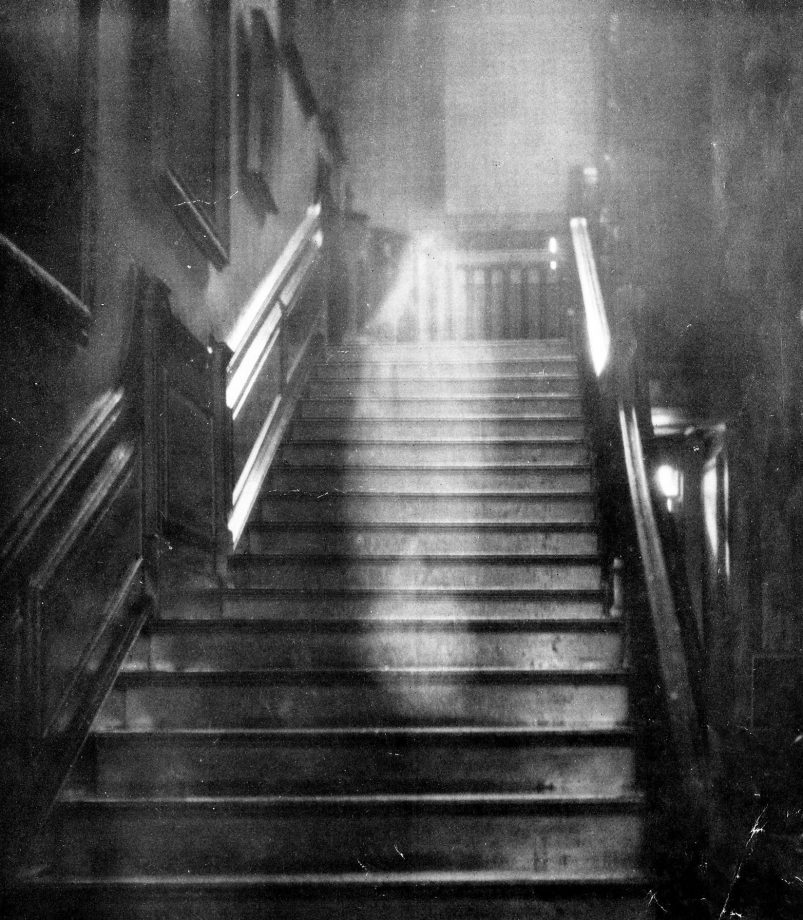
Famous ghost photograph of the Brown Lady of Raynham Hall, originally taken for Country Life (first published in December 1936).
Halloween is the night when ghosting means more than not texting back last night’s date. One look in the neighbor’s yard reveals sheeted spirits strung up between branches to give the home a festive glow. However, more and more often these days, reports are flying in of real-life spirits living in domestic dwellings. It’s a chilling prospect – with the real estate market as hot as it is today, moving into a new home with a poltergeist roommate is a possibility. An unknowing buyer might be buying a house that comes with spooky strings attached.
They’re HEEEERRREEEE!
As the New York Times reported last week, more and more people believe in ghosts and think they are cohabitating with an otherworldly roommate. In fact, a recent survey revealed that 65% of Gen Zers (people born between 1997 and 2012) thought their home was haunted, while only 35% of baby boomers (those born between 1946 and 1964) surveyed thought the same. Why are the number of believers growing? Perhaps it is due to more time spent at home during Covid lockdowns; with more individuals working remotely, people are hearing creeks and bumps they never noticed before. Alternatively, the rise in believers may be the result of the reports of the paranormal in the media or a decline in religious beliefs.
If the house-crashing ghost is a friendly one, like Casper, then perhaps the spirited company is an added bonus. In fact, a handful of families have even reported enjoying the company of certain ghostly presences, either because the spirits are benevolent or because the family senses that they may have been dearly departed relatives or friends. So how does someone live peacefully with a spiritual presence? Maybe he or she should adhere to the Korean tradition of memorializing ancestors (“jesa”) which incorporates awareness of and respect toward loved ones who have passed away.
“Who Ya Gonna Call?” (Your realtor?)
Conversely, an aggressive ghost bent on scaring and taunting homeowners is a different story. A reasonable family would not purchase a house that came with a very real and present threat to their lives, imagined or otherwise. Or worse, a house may come with a threatening stalker. This terrifying scenario finds its way into modern culture through shows like “The Watcher” on Netflix. In the show (creepily based on a true story), a couple purchases a home in New Jersey without knowing that danger accompanied the house. As it turns out, a stalker, who terrorized the family with threatening letters, was the free-gift-with-purchase. One would assume that if the couple had known of the stalker’s existence, they would have chosen to live somewhere else.

One Hundred Ghost Stories (Haunted House by Hayashiya Shozo), by Utagawa Kuniyoshi, Japan, Edo period, 1800s AD
Framed in this light, a paranormal danger that comes with the house could be considered a “defect.” If it is, then the seller may be required to disclose the defect, depend on the state’s law where the property sits. In New York, where real estate is selling faster than ever, must sellers reveal the presence of ghosts? This question made its way into state law with the entertaining opinion in Stambovsky v. Ackley, 169 A.D.2d 254 (N.Y. App. Div. 1991). In Stambovsky (known as “The Ghostbusters Case”), a couple purchased a house that the previous owner had been marketing as “officially haunted.” In fact, this verbose owner had given an interview to Reader’s Digest purporting the presence of poltergeists in the house (alliteratively entitled “Our Haunted House on the Hudson).
When the new buyers discovered this, they were spooked. They sought damages, or, in the alternative, recission of the contract. The appellate court enabled the scared buyers to rescind the contract, and the court actually incorporated ghost-themed turns of phrase into the official opinion. Phrases like “I am moved by the spirit of equity”, and, “the notion […] is a hobgoblin which should be exorcised from the body of legal precedent,” appear, along with quotations from Ghostbusters and Shakespeare’s Hamlet. If this case teaches its readers anything, it is that, as it turns out, judges can be fun at parties.
The holding turned on the fact that the seller had very publicly declared the house to be haunted (and, so, was legally estopped from claiming it was without paranormal activity). The Court (rather sassily) stated that, even though no reasonable means could be employed to ensure that the house was not haunted prior to sale, the seller (in this case) clearly took advantage of the buyer in “a most unnatural bargain.” The buyer was able to rescind the contract, thus setting the precedent for other New York buyers to argue the same remedy in future cases. New Jersey is the only other state with explicit requirements regarding paranormal activity, requiring a seller to disclose information about potential poltergeists, if asked. As for the rest of the nation? Buyers may want to familiarize themselves with the contract, because it’s often buyer beware when it comes to spirits. If you don’t properly review your contract, your purchase may haunt you for years to come.
Happy Halloween!